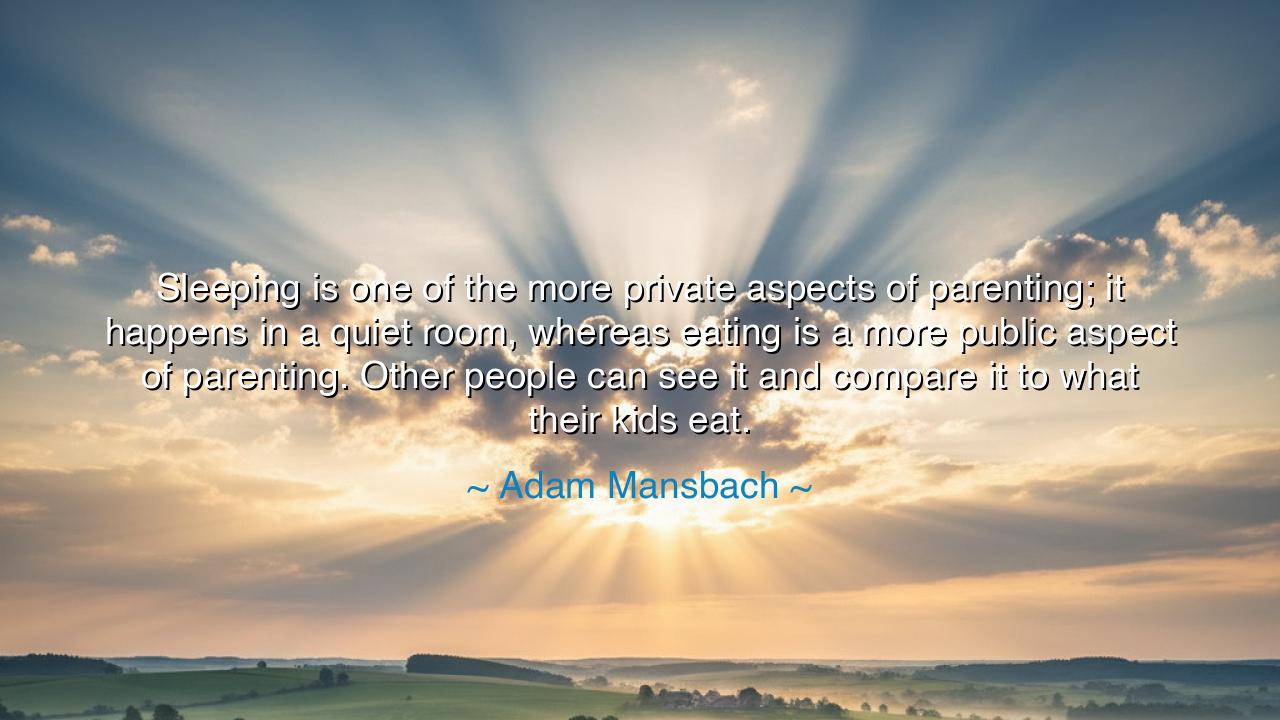
Sleeping is one of the more private aspects of parenting; it
Sleeping is one of the more private aspects of parenting; it happens in a quiet room, whereas eating is a more public aspect of parenting. Other people can see it and compare it to what their kids eat.






When Adam Mansbach declared: “Sleeping is one of the more private aspects of parenting; it happens in a quiet room, whereas eating is a more public aspect of parenting. Other people can see it and compare it to what their kids eat,” he revealed a truth both subtle and profound. His words remind us that parenting is lived partly in the unseen silence of the home and partly in the glaring light of public judgment. Some labors of the parent occur in solitude, known only to the child and the walls of the house. Others are displayed before the eyes of the world, open to comparison, criticism, and praise.
The origin of this reflection lies in Mansbach’s keen observation of parental life. The struggles of bedtime — the endless rocking, the whispered lullabies, the tears shed in the still of night — are battles fought unseen, victories and defeats witnessed only by parent and child. But the act of feeding — of choosing what a child eats, how much, and how it is offered — is visible to others. In this visibility lies the sting of judgment, as parents compare themselves to one another and as strangers impose their opinions. Thus, sleep becomes a private crucible of patience, while food becomes a public measure of success.
History itself shows this divide between the private and the public in family life. In ancient Rome, for instance, the household gods, the Lares and Penates, were honored in the private rituals of the home, unseen by outsiders. These quiet practices shaped the soul of the family in hidden ways. But in the public squares, festivals and feasts displayed the household’s prosperity and discipline for all to see. So too in parenting: the hidden work of sleep, unseen but sacred, shapes the child’s growth, while the visible act of eating displays the parent’s choices for the judgment of the community.
Mansbach’s words carry an emotional truth: parents often feel shame not over what happens in private, but over what is seen in public. A child who refuses to sleep through the night brings exhaustion, but no one outside the home need know. A child who refuses vegetables or eats sweets before others, however, may bring glances, murmurs, and comparison. This tension adds to the burdens of parents, who already wrestle with doubt. His reflection teaches us to be gentle, for much of what determines a child’s well-being happens in silence, unseen, and cannot be measured by the fleeting image of a mealtime.
The wisdom here is also heroic: it reminds us that the greatest labors are often the ones unseen. The mother who spends long nights soothing her child, the father who rises in darkness to hush fears — their victories are private, but they shape the soul of the child more than any public act. The world may see what the child eats and cast judgment, but it does not see the sleepless nights of sacrifice that shape the bond between parent and child. True parenting, then, is measured not by public approval, but by the private devotion known only to love.
The lesson is clear: do not let the gaze of others determine your worth as a parent. Remember that what matters most often happens in silence, behind closed doors, where no one can compare or criticize. At the same time, be slow to judge other parents, for what you see in public is only a fragment of their struggle, a single scene from a much larger story. The unseen hours of their night may be filled with sacrifices you cannot imagine.
Practical actions must follow: parents should learn to release the burden of comparison, focusing instead on the unseen bond they nurture with their children. Create rhythms of care in private — bedtime rituals, gentle words, consistent love — and let them outweigh the fleeting judgments of strangers. And in public, offer compassion rather than critique, for every parent walks through battles invisible to the eye.
So let Adam Mansbach’s words echo as ancient wisdom: some aspects of parenting are private, others public — but both are sacred. The world may see the child’s plate, but only love sees the child’s sleep. And it is in that hidden love, poured out in silence, that the true strength of a parent is revealed.






AAdministratorAdministrator
Welcome, honored guests. Please leave a comment, we will respond soon